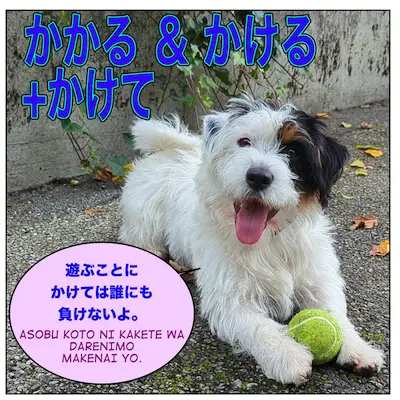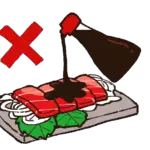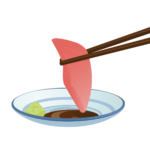
遊ぶことにかけては誰にも負けないよ。
= あそぶことにかけてはだれにもまけないよ。
= Asobu koto ni kakete wa dare nimo makenai yo.
= When it comes to playing, no one can beat me!
Hi everyone! I’m your guest teacher for today, Ike. I’m from Switzerland. I love playing with balls.
Today, we’re going to study the most frequently used verbs, かかる ( = kakaru) and かける ( = kakeru) , as well as a grammatical expression using かけて ( = kakete).
Note: For the usage of Verb+ かける ( = kakeru)
Check this lesson ⬇️
How to use V + 始める ( = hajimeru) / だす ( = dasu) / かける ( = kakeru)
⭐️How to form:
* かける = kakeru (transitive verb)
→(someone/something に ( = ni) )something + を ( = wo) + かける ( = kakeru)
* かかる = kakaru (intransitive verb)
→(someone/something に ( = ni))something + が ( = ga) + かかる ( = kakaru)
⚫︎ 掛ける = かける = kakeru (transitive verb) / 掛かる = かかる = kakaru = intransitive verb
There are several different kanji for かける & かかる ( = kakeru & kakaru)
The first one is 掛ける = かける = kakeru /掛かる = かかる = kakaru
They are often written in hiragana, so I will use hiragana in most of the examples. However, since some are customarily written in kanji, I will include a few examples
They have many different meanings, so let’s go through them one by one.
⭐️To play music
* 音楽をかける = おんがくをかける = ongaku wo kakeru = to play music (transitive)
→音楽がかかる = おんがくがかかる = ongaku ga kakaru = music plays (intransitive)
(In the car)
Ex. 好きな音楽をかけていいよ。
= すきなおんがくをかけていいよ。
= Sukina ongaku wo kakete ii yo.
= You can play any music you like.
(At a club)
Ex. 好きな曲がかかったから踊ってくるよ。
= すきなきょくがかかったからおどってくるよ。
= Sukina kyoku ga kakatta kara odotte kuru yo.
= My favorite song is playing, so I’m going to dance!
⭐️To hang or suspend/ put on or wear glasses
Ex. 壁に絵をかける
= かべにえをかける
= Kabe ni e wo kakeru.
= to hang a picture on the wall
Ex. 壁にかかっている絵は誰が描いたのですか?
= かべにかかっているえはだれがかいたのですか?
= Kabe ni kakatte iru e wa dare ga kaita no desu ka?
= Who painted the picture that is hanging on the wall?
Ex. 上着を椅子の背にかける。
= うわぎをいすのせにかける。
= Uwagi wo isu no se ni kakeru.
= To hang a jacket on the back of a chair.
* 眼鏡をかける 👓
= めがねをかける
= Megane wo kakeru.
= to put on/wear glasses
Ex. 近眼なので眼鏡をかけないとよく見えない
= きんがんなのでめがねをかけないとよくみえない
= Kingan nano de megane wo kakenai to yoku mienai.
= Because I’m nearsighted, I can’t see well unless I wear glasses.
⭐️to start a machine/apply a machine
Although there are only a few machines and appliances you can use them with, here are some common ones.
* エンジンをかける = enjin wo kakeru = to start the engine (transitive)
→エンジンがかかる = enjin ga kakaru = the engine starts (intransitive)
Ex. 父はもう外で車のエンジンをかけて待っていた。
= ちちはもうそとでくるまのエンジンをかけてまっていた。
= Chichi wa mou soto de kuruma no enjin wo kakete matte ita.
= My father had already started the car engine and was waiting outside.
or My father was already waiting outside with the car engine running.
Ex. 寒い朝にエンジンがかからないことがある。
= さむいあさにエンジンがかからないことがある。
= Samui asa ni enjin ga kakaranai koto ga aru.
= Sometimes the engine doesn’t start on cold mornings.
* 掃除機をかける = そうじきをかける = soujiki wo kakeru = to vacuum
* アイロンをかける = airon wo kakeru = to iron
Ex. 日曜日は、掃除機をかけたり、シャツにアイロンをかけたりして忙しい。
= にちようびは、そうじきをかけたり、シャツにアイロンをかけたりしていそがしい。
= Nichiyoubi wa, soujiki wo kaketari, shatsu ni airon wo kaketari shite isogashii.
= On Sundays, I’m busy vacuuming, ironing shirts, among other things.
*ミシンをかける = mishin wo kakeru = to sew with a sewing machine
Ex. スカートの裾にミシンをかけるのは面倒だ。
= スカートのすそにミシンをかけるのはめんどうだ。
= Sukaato no suso ni mishin wo kakeru no wa mendou da.
= It’s a hassle to sew the hem of the skirt.
Note: The noun forms are
→アイロンがけ = airongake = ironing (the act of ironing)
→ミシンがけ = mishingake = sewing (the act of sewing with a sewing machine)
Ex. ミシンがけをするのは面倒だ。
= ミシンがけをするのはめんどうだ。
= Mishingake wo suru nowa mendou da.
= It’s a hassle to sew with a sewing machine.
* パーマをかける = paama wo kakeru = to get a perm
Ex. 梅雨になって髪の毛がうねるからストパ(ストレートパーマ)をかけたい。
= つゆになってかみのけがうねるからストパ(ストレートパーマ)をかけたい。
= Tsuyu ni natte kaminoke ga uneru kara sutopa (sutoreeto paama) wo kaketai.
= My hair gets wavy in the raining season, so I want to get a straight perm.
Note: ストパ = sutopa = conversational/slang: It is an abbreviation for ストレートパーマ ( = sutoreeto paama = straight perm).
In the Kansai area, some people use 当てる= あてる ( = ateru) instead of かける ( = kakeru) , so they might say パーマを当てる = パーマをあてる = paama wo ateru (get a perm) instead of パーマをかける ( = paama wo kakeru) .
⭐️Wiping or cleaning
* モップをかける = モップをかける = moppu wo kakeru = to mop (the floor) with a mop
* 雑巾をかける = ぞうきんをかける = zoukin wo kakeru = to wipe or clean the floor with a rag
Note 1)
Noun form:
→モップがけ = moppugake = mopping (the floor) with a mop
→雑巾がけ = ぞうきんがけ = zoukin wo kakeru = wiping or cleaning with a rag
Ex. 日本の小学生は、自分の教室の雑巾掛けをする。
= にほんのしょうがくせいは、じぶんのきょうしつのぞうきんがけをする。
= Nihon no shougakusei wa, jibun no kyoushitsu no zoukingake wo suru.
= Japanese elementary school students wipe their own classroom floors with a rag.
Note 2)
There is a similar expression
→雑巾で拭く = ぞうきんでふく ( = zoukin de fuku) = to wipe something with a rag.
When wiping a table, you don’t say 雑巾をかける = ぞうきんをかける ( = zoukin wo kakeru) . You say 雑巾で拭く = ぞうきんでふく ( = zoukin de fuku ) = to wipe with a rag
⭐️To apply/put on (a substance)
* ワックスをかける = wakkusu wo kakeru = to wax
Ex. 車にワックスをかける。
= くるまにワックスをかける。
= Kuruma ni wakkusu wo kakeru.
= to apply wax to a car.
Noun form: ワックスがけ = ワックスがけ = wakkusu gake = waxing
→車にワックスがけをする。
= くるまにワックスがけをする。
= Kuruma ni wakkusu gake wo suru.
= To apply wax to a car.
*スプレーをかける = supuree wo kakeru = to apply spray (transitive)
→スプレーがかかる = supuree ga kakaru = to be sprayed / to have spray applied (by accident) (intransitive)
Ex. 外は、蚊が多いから虫除けスプレーをかけた方がいいよ。
= そとは、かがおおいからむしよけスプレーをかけたほうがいいよ。
= Soto wa, ka ga ooi kara mushiyoke supuree wo kaketa hou ga ii yo.
= There are a lot of mosquitoes outside so you should use mosquito repellent spray.
Ex. スプレーが顔にかかってしまった。
= スプレーがかおにかかってしまった。
= Supuree ga kao ni kakatte shimatta.
= The spray accidentally got on my face. / I got spray on my face by accident.
⭐️ to place something on fire
* 火にかける = ひにかける = hi ni kakeru = to put something on the fire (when you are cooking, boiling something)
Ex. スープを火にかけてください。
= スープをひにかけてください。
= Suupu wo hi ni kakete kudasai.
= Please put the soup on the fire (to cook it).
⭐️To make a phone call or contact someone
電話をかける = でんわをかける = denwa wo kakeru = to make a phone call (transitive)
→ 電話がかかる = でんわがかかる = denwa ga kakaru = the phone rings, or a call comes through (intransitive)
Ex.日本に電話をかけたいのですが国番号は何番ですか?
= にほんにでんわをかけたいのですがくにばんごうはなんばんですか?
= Nihon ni denwa wo kaketai no desu ga kunibangou wa nanban desu ka?
= I would like to make a phone call to Japan, but what is the country code?
Ex. 日曜日なのに上司から何回も電話がかかってきた。
= にちようびなのにじょうしからなんかいもでんわがかかってきた。
= Nichiyoubi nano ni joushi kara nankai mo denwa ga kakatte kita.
= Even though it was Sunday, my boss called me several times.
⭐️ To spend money/ cost money
(money related word) + を ( = wo) + かける ( = kakeru ) = to spend ~ (transitive)
→(money related word) + が ( = ga) + かかる ( = kakaru ) = to cost ~ (intransitive)
* お金をかける = おかねをかける = okane wo kakeru = to spend money (transitive)
→お金がかかる = おかねがかかる = okane ga kakaru = to cost money (intransitive)
Ex. どれだけエステにお金をかけても効果がなかった。
= どれだけエステにおかねをかけてもこうかがなかった。
= Doredake esute ni okane wo kaketemo kouka ga nakatta.
= No matter how much money I spent on facial treatments, there was no effect.
Ex. 私立大学は公立大学よりお金がかかる。
=しりつだいがくはこうりつだいがくよりおかねがかかる。
= Shiritsu daigaku wa kouritsu daigaku yori okane ga kakaru
= Private universities cost more money than public universities.
Ex. 車の修理に30万円もかかった。
= くるまのしゅうりにさんじゅうまんえんもかかった。
= Kuruma no shuuri ni sanjuuman en mo kakatta.
= It cost 300,000 yen to repair the car.
* 税金がかかる = ぜいきんがかかる = zeikin ga kakaru = to incur tax (to be subject to tax)
Ex. 仮想通貨で儲けても税金がかかるから気をつけないといけない。
= かそうつうかでもうけてもぜいきんがかかるからきをつけないといけない。
= Kasoutsuuka de mouketemo zeikin ga kakaru kara ki wo tsukenai to ikenai.
= Even if you make money with cryptocurrency, you need to be careful because taxes will apply.
* 費用がかかる = ひようがかかる = hiyou ga kakaru = to cost money
Ex. 引越し費用はどれぐらいかかったの?
= ひっこしひようはどれぐらいかかったの?
= Hikkoshi hiyou wa doregurai kakatta no?
= How much did the moving costs come to? / How much did the moving cost?
* 交通費がかかる = こうつうひがかかる = koutsuuhi ga kakaru = to cost transportation fees
Ex. 毎週東京に行きたいが交通費がかかるから月に1回にしている。
= まいしゅうとうきょうにいきたいがこうつうひがかかるからつきにいっかいにしている。
= Maishuu Toukyou ni ikitai ga koutsuuhi ga kakaru kara tsuki ni ikkai ni shiteiru.
= I would like to go to Tokyo every week, but transportation costs a lot, so I only go there once a month.
⭐️ To spend time/ something takes time
* 時間をかける = じかんをかける = jikan wo kakeru = to spend time on something (transitive)
→時間がかかる = じかんがかかる = jikan ga kakaru = something takes time (intransitive)
Ex. この問題は時間をかけて解決していかなくてはいけない。
= このもんだいはじかんをかけてかいけつしていかなくてはいけない。
= Kono mondai wa jikan wo kakete kaiketsu shite ikanakute wa ikenai.
= This problem must be solved with time and effort.
Ex. 会社から家まで渋滞で2時間かかった。
= かいしゃからいえまでじゅうたいでにじかんかかった。
= Kaisha kara ie made juutai de nijikan kakatta.
= It took two hours to get from the office to home because of traffic.
⭐️ to insure/ to get insured
* 保険をかける = ほけんをかける = hoken wo kakeru = to insure/to take out insurance
Ex. 海外旅行に行く時は、絶対に保険をかけていったほうがいい。
= かいがいりょこうにいくときは、ぜったいにほけんをかけていったほうがいい。
= Kaigai ryokou ni iku toki wa, zettai ni hoken wo kakete itta hou ga ii.
= When going on a trip abroad, you should definitely take out insurance.
⭐️ To cause inconvenience or impositions on someone
* 迷惑をかける = めいわくをかける = meiwaku wo kakeru = to cause trouble/inconvenience (transitive)
→迷惑がかかる = めいわくがかかる = meiwaku ga kakaru = something causes inconvenience/trouble (intransitive)
Ex. 迷惑をかけてごめんなさい。
= めいわくをかけてごめんなさい。
= Meiwaku wo kakete gomennasai.
= I’m sorry for causing trouble.
(polite/formal)
→ご迷惑をおかけして申し訳ございません。
= ごめいわくをおかけしてもうしわけございません。
= Gomeiwaku wo okakeshite moushiwake gozaimasen.
= I sincerely apologize for causing trouble.
* 手間をかける = てまをかける (= tema wo kakeru) to cause someone extra effort (transitive)
→手間がかかる = てまがかかる ( = tema ga kakaru ) = effort is needed (intransitive)
Ex. この料理は母が手間をかけて作ってくれた。
= このりょうりはははがてまをかけてつくってくれた。
= Kono ryouri wa haha ga tema wo kakete tsukutte kureta.
= My mother made this dish with a lot of time and care.
Ex. 忙しいからあまり手間のかかる料理は作りたくない。
= いそがしいからあまりてまのかかるりょうりはつくりたくない。
= Isogashii kara amari tema no kakaru ryouri wa tsukuritaku nai.
= I don’t want to make dishes that take too much time and effort because I’m busy.
* 負担をかける= ふたんをかける = futan wo kakeru = to burden someone (transitive)
→負担がかかる = ふたんがかかる = futan ga kakaru = a burden is placed (intransitive)
Ex. 寝る前に食べると胃に負担がかかる。
= ねるまえにたべるといにふたんがかかる。
= Neru mae ni taberu to i ni futan ga kakaru.
= Eating before bed puts a strain on your stomach.
* 心配をかける = しんぱいをかける = shinpai wo kakeru = to cause worry
Ex. 学生の時は親に心配をいっぱいかけた。
= がくせいのときはおやにしんぱいをいっぱいかけた。
= Gakusei no toki wa oya ni shinpai wo ippai kaketa.
= When I was a student, I made my parents worry a lot.
Ex. 心配をかけてごめんなさい。
= しんぱいをかけてごめんなさい
= Shinapi wo kakete gomennasai.
= I’m sorry for making you worry.
Note: Polite
→ご心配をおかけして申し訳ございません。
= ごしんぱいをおかけしてもうしわけございません。
= Goshinpai wo okake shite moushiwake gozaimasen.
Sometimes you just say
心配をかけました。
=しんぱいをかけました。
= Shinpai wo kakemashita.
→(polite) ご心配をおかけしました。
= ごしんぱいをおかけしました。
= Goshinpai wo okake shimashita.
The literal meaning is, I made you worry but it implies an apology.
* 手数をかける = てすうをかける = tesuu wo kakeru = to cause someone trouble (extra steps)
(polite/formal)
Ex. お手数をおかけしました。
= おてすうをおかけしました。
= Otesuu wo okake shimashita.
= I apologize for the trouble I caused.(←The literal meaning is “I troubled you.” but it implies an apology)
* 期待がかかる = きたいがかかる = kitai ga kakaru = to have expectations placed on someone or something (transitive)
→期待をかける = きたいをかける = kitai wo kakeru = to place expectations on someone or something (intransitive)
Note: You usually use hiragana for かかる/かける = kakaru/kakeru, but both kanji 掛かる/掛ける and 懸かる/懸ける can be used.
Ex. 新人プレーヤーに大きな期待がかかっている。
= しんじんプレーヤーにおおきなきたいがかかっている。
= Shinjin pureeyaa ni ookina kitai ga kakatte iru.
= There’s a lot of pressure on the rookie. / They’re expecting a lot from the new player.)
⭐️to sit/sit down
* 椅子にかける = いすにかける = isu ni kakeru = to sit on a chair
Ex. こちらの椅子にかけてお待ちください。
= こちらのいすにかけておまちください。
= Kochira no isu ni kakete omachi kudasai.
= Please sit on this chair and wait.
Note: Polite form of かける ( = kakeru) is おかけになる ( = okakeni naru)
こちらの椅子におかけになってお待ちください。
= こちらのいすにおかけになっておまちください。
= Kochira no isu ni okake ni natte omachi kudasai.
= Please sit on this chair and wait. (polite)
こちらにおかけください。
= Kochira ni okake kudasai.
= Please sit here.
* 腰掛ける = こしかける = koshikakeru = to sit down
Ex. 疲れたからどこかに腰掛けたい。
= つかれたからどこかにこしかけたい。
= Tsukareta kara dokoka ni koshikaketai.
= I’m tired, so I want to sit down somewhere.
Note: The literal meaning of 腰 = こし = koshi = lower back/waist area of the body
🔸Idiomatic expression:
* 腰掛け仕事 = こしかけしごと = koshikake shigoto
= (negative) a makeshift job / A short-term or unimportant job, often considered not serious.
⭐️to lock
* 鍵をかける = かぎをかける = kagi wo kakeru = to lock (a door) (transitive)
→鍵がかかる =かぎがかかる = kagi ga kakaru = the lock is engaged (intransitive)
Ex. 出かける時は必ず玄関の鍵をかけてください。
= でかけるときは かならず げんかんの かぎを かけてください。
= Dekakeru toki wa kanarazu genkan no kagi wo kakete kudasai.
= Please be sure to lock the front door when you go out.
Ex. その金庫は鍵がかかっているので家族以外は誰も開けることができない。
= そのきんこはかぎがかかっているのでかぞくいがいはだれもあけることができない。
= Sono kinko w kagi ga kakatte iru node kazoku igai wa dare mo akeru koto ga dkeinai
= The safe is locked, so no one except for my family can open it.
⭐️To put on, to cover
* 布団をかける = ふとんをかける = futon wo kakeru = to put a futon(duvet) on
(Talking to a child.)
Ex. 寒いからきちんと布団をかけて寝なさい。
= さむいからきちんとふとんをかけてねなさい。
= Samui kara kichin to futon wo kakete nenasai.
= It’s cold so you have to put the duvet on properly (while sleeping)
* 毛布をかける = もうふをかける = moufu wo kakeru = to put on a blanket
Ex. 妻がソファで昼寝をしていたから毛布をかけてあげた。
= つまがソファでひるねをしていたからもうふをかけてあげた。
= Tsuma ga sofa de hirune wo shite ita kara moufu wo kakete ageta.
= Since my wife was taking a nap on the sofa, I covered her with a blanket.
* テーブルクロスをかける = teeburu kurosu wo kakeru = to put on a tablecloth (transitive)
→テーブルクロスがかかる = teeburu kurosu ga kakaru = a table cloth is on (the table) (intransitive)
Ex. お客さんが来るから新しいテーブルクロスをかけよう。
= おきゃくさんがくるからあたらしいテーブルクロスをかけよう。
= Okyakusan ga kuru kara atarashii teeburu kurosu wo kakeyou.
= Since guests are coming, let’s put out a new tablecloth.
Ex. 新しいテーブルクロスがかかっている。
= あたらしいテーブルクロスがかかっている。
= Atarashii teeburu kurosu ga kakatte iru.
= A new tablecloth is out on (the table).
⭐️Multiplication (math)
Ex. 3掛ける3は9
= さんかけるさんは、きゅう
= san kakeru san wa kyuu
= 3 x 3= 9 (three multiplied by three is nine)
Note: 掛け算 = かけざん = kakezan = multiplication
⭐️To pour or sprinkle something over food
(something) に ( = ni) (something) を ( = wo) + かける ( = kakeru) (transitive)
(something) が ( = ga) (something) に ( = ni) + かかる ( = kakaru) ( intransitive)
Ex. 卵をご飯にかける
= たまごをごはんにかける
= Tamago wo gohan ni kakeru
= to put a raw egg on rice

Note: Noun form: 卵かけご飯 = たまごかけごはん = tamago kake gohan = raw egg over rice.
It is a typical Japanese dish. In slang you say TKG (ティーケイジー = tiikeijii) = Tamago Kake Gohan)
Ex. 醤油を刺身にかける
= しょうゆをさしみにかける
= Shouyu wo sashimi ni kakeru
= to pour soy sauce on sashimi (thinly sliced raw fish)

Note: If you just dip sashimi into soy sauce, you say
→刺身を醤油につける
= さしみをしょうゆにつける
= Sashimi woi shouyu ni tsukeru
= to dip sashimi into soy sauce.

Ex. これは、塩と胡椒をかけて食べてください
= これは、しおとこしょうをかけてたべてください。
= Kore wa, shio to koshou wo kakete tabete kudasai.
= Please eat this with salt and pepper on it. (←Literal translation: Please sprinkle salt and pepper on this and eat it.)
Note: When you go to an udon noodle shop, you might see かけうどん ( = kakeudon) on the menu. That means udon noodles with a simple broth poured over them, or some people might just order it by saying:
かけおねがいします ( = kake udon onegai shimasu) , which means, ‘one かけうどん ( = kake udon) (One order of udon noodles with a simple broth poured over them) please.
⭐️Idiomatic expressions
* 声をかける = こえをかける = koe wo kakeru = to call out to someone (intransitive)
→声がかかる = こえがかかる = koe ga kakaru = to be recognized or chosen, often by someone of higher status like a boss, receiving special attention or favor (transitive)
Ex. 何か困ったことがあったらいつでも声をかけてください。
= なにかこまったことがあったらいつでもこえをかけてください。
= Nanika komatta koto ga attara itsudemo koe wo kakete kudasai.
= If you have any problems, feel free to ask me anytime.
Note: お声がけください = おこえがけください = okoegake kudasai = Please reach out (more formal).
Ex. 新しい部署で働かないかと社長から声がかかった。
= あたらしいぶしょではたらかないかとしゃちょうからこえがかかった。
= Atarashii busho de hatarakanai ka to shachou kara koe ga kakatta.
= The president asked me if I wanted to work in a new department.
* 魔法に/をかける = まほうにかける = mahou ni/wo kakeru = to cast a spell
Ex. 王子様は魔法をかけられて蛙(かえる/カエル)になった。
= おうじさまはまほうをかけられてかえる/カエルになった。
= Oujisama wa mahou wo kakerarete kaeru ni natta.
= The prince was put under a spell and turned into a frog.
* 魔法にかかる = まほうにかかる = mahou ni kakaru = to be affected by magic
Ex. その光景を見たらまるで魔法にかかったかのように動けなくなった。
= そのこうけいをみたらまるでまほうにかかったかのようにうごけなくなった。
= Sono koukei wo mitara maru de mahou ni kakattaka no you ni ugokenaku natta.
= When I saw that scene, I became unable to move, as if under a spell.
* 呪文をかける = じゅもんをかける = jumon wo kakeru = to cast an incantation
* 目を掛ける = めをかける = me wo kakeru = to take special notice of someone/to look after someone
Ex. 野球部に入ったときから先輩*に目をかけてもらっていた。
= やきゅうぶにはいったときからせんぱいにめをかけてもらっていた。
= Yakyuubu ni haitta toki kara senpai ni me wo kakete moratte ita.
= Since I joined the baseball club, the seniors had been looking out for me.
Note: 先輩 = せんぱい ( = senpai) refers to a student who is older or in a higher grade than you.
磨きが掛かる (intransitive)
= みがきがかかる
= Migaki ga kakaru
= to be polished/ improved (skill, appearance, character or condition)
→磨きを掛ける (transitive)
= みがきをかける
= Migaki wo kakeru
= to polish/to improve (skill, appearance, character or condition)/to put effort into improving or refining something
Ex. 芸に磨きがかかったね
= げいにみがきがかかったね
= Gei ni migaki ga kakatta ne.
= Your skills have improved, haven’t they?
Note:When you are talking to a performer, like a musician, dancer, or actor, and you want to compliment them on how much their performance has improved.
Ex. 発表会までもう二週間しかない。もっと磨きをかけなくてはいけない。
= はっぴょうかいまでもうにしゅうかんしかない。もっとみがきをかけなくてはいけない。
= Happyoukai made mou nishuukan shika nai. Motto migaki wo kakenakute wa ikenai.
= There are only two weeks left until the recital. I must work harder to improve.
***
Now, let’s look at another kanji for かける( = kakeru) that has different meanings.
⚫︎欠ける = かける = kakeru = to be chipped, missing, or lacking: to describe something being incomplete or damaged.
Ex. 一人でも選手が欠けたら試合に出られない。
= ひとりでもせんしゅがかけたらしあいにでられない。
= HItori demo senshu ga kaketara shiai ni derarenai.
= If even one player is missing, we can’t participate in the match.
Ex. ご飯茶碗が欠けた。
= ごはんぢゃわんがかけた。
= Gohanjawan ga kaketa
= The rice bowl got chipped.
⚫︎賭ける = かける = kakeru = to bet or gamble (transitive)
Ex. お金を賭けることは法律で禁止されています。
= おかねをかけることはほうりつできんしされています。
= Okane wo kakeru koto aw houritsu de kinshi sarete imasu.
= Betting money is prohibited by law.
🔸Idiomatic Expressions:
* 賭けてもいい = かけてもいい = Kaketemo ii = You/I can bet on it./ You/I can be sure something will happen.
Ex. 彼は絶対に来るよ。賭けてもいい!
= かれはぜったいにくるよ。かけてもいい!
= Kare wa zettai ni kuru yo. Kaketemo ii!
= He’ll definitely come. I can bet on it!
You use this expression when you want to show strong confidence in something, implying that you are so sure about it that you would bet on it.
⚫︎懸かる = かかる = kakaru
* 雲が懸かる = くもがかかる = kumo ga kakaru = clouds hang over
Ex. 山に雲がかかってきた。もうすぐ雨が降るかもしれない。
= やまにくもがかかってきた。もうすぐあめがふるかもしれない。
= Yama ni kumo ga kakatte kita. Mousugu ame ga furukamo shirenai.
= Clouds have started to cover the mountain. It might rain soon.
* 命が懸かる= いのちがかかる = inochi ga kakaru = one’s life is at stake (intransitive)
→命を懸ける = いのちをかける = inochi wo kakeru = to risk /stake one’s life (transitive)
Ex. この手術には患者の命が懸かっています。
= このしゅじゅつにはかんじゃのいのちがかかっています。
= Kono shujutsu niwa kanja no inochi ga kakatte imasu.
= The patient’s life is at stake in this surgery.
Note: Noun form 命懸け = いのちがけ = inochigake
Ex. 命懸けで家族を守ります。
= いのちがけでかぞくをまもります。
= Inochigake de kazoku wo mamorimasu.
= I will risk my life to protect my family.
* 生活が懸かる = せいかつがかかる = seikatsu ga kakaru = one’s livelihood depends on it
Ex. いやな仕事でも生活が懸かっているのでなかなかやめられない。
= いやなしごとでもせいかつがかかっているのでなかなかやめられない。
= Iyana shigoto demo seikatsu ga kakatte iru node nakanaka yamerarenai.
= Even though it’s an unpleasant job, I can’t just quit. My livelihood is at stake.
* 霧が懸かる = きりがかかる = kiri ga kakaru = fog settles
Ex. 夕方になると霧がかかって危ないから運転は気をつけてください。
= ゆうがたになるときりがかかってあぶないからうんてんはきをつけてください。
= Yuugata ni naru to kiri ga kakatte abunai kara unten wa ki wo tsukete kudasai.
= In the evening, it gets foggy, so please drive carefully.
* 賞金を懸ける = しょうきんをかける = shoukin wo kakeru = to stake a prize / to offer a prize
→賞金が懸かる = しょうきんがかかる = shoukin ga kakaru = there’s a bounty on it / there is a prize at stake
Ex. 二百人(200人)の人が賞金を懸けて競い合った。
= にひゃくにんのひとが しょうきんをかけて きそいあった。
= Nihyaku nin no hito ga shoukin wo kakete kisoiatta.
= 200 people competed for the prize.
Ex. このコンテストには50万円の懸賞金がかかっています。
= このコンテストにはごじゅうまんえんのけんしょうきんがかかっています。
= Kono kontesuto niwa gojuuman-en no kenshoukin ga kakatte imasu.
= This contest has a prize of 500,000 yen at stake.
🔸Something + に ( = ni) + かかる( = kakaru) = something depends on or is influenced by something else
Basic format:
⭐️ ~は ~にかかっている = ~ wa ~ ni kakatte iru = ~ depends on/relies on ~
⭐️~か~は~にかかっている = ~ ka ~ wa ~ ni kakatte iru
or ~かどうかは ~にかかっている = ~ ka douka wa ~ ni kakatte iru
= whether ~ or not depends on ~
Ex. 美味しい料理は素材と料理人の腕にかかっている。
= おいしいりょうりは そざいとりょうりにんのうでにかかっている。
= Oishii ryouri wa sozai to ryourinin no ude ni kakatte iru.
= Delicious food depends on the ingredients and the chef’s skill.
Ex. 日本語能力試験(JLPT)に受かるか受からないかはどれだけ勉強するかにかかっている。
= にほんごのうりょくしけん(JLPT)にうかるかうからないかはどれだけべんきょうするかにかかっている。
= Nihongo nouryoku shiken (JLPT) ni ukaru ka ukaranai ka wa doredake benkyou suru ka ni kakatteiru.
= Whether or not you pass the Japanese-Language Proficiency Test (JLPT) depends on how much you study.
Note: You can also say
受かるかどうかは ( = うかるかどうかは= ukaru ka dou ka wa) instead of
受かるか受からないかは( = うかるかうからないかは = ukaru ka ukaranai ka wa )
⚫︎架ける = かける = kakeru = to build (a bridge, etc.)
→ (intransitive verb) 架かる = かかる = kakaru = to be built (a bridge, etc.)
* 橋を架ける = はしをかける = hashi wo kakeru = to build a bridge (transitive)
→ (intransitive verb) 橋が架かる = はしがかかる = hashi ga kakaru = a bridge is built
Ex. 離島と本土を結ぶ橋がやっと架かった。
= りとうとほんどをむすぶはしがやっとかかった。
= Ritou to hondo wo musubu hashi ga yatto kakatta.
= A bridge connecting the remote island and the mainland has finally been built.
Note: 架け橋 = かけはし = kakehashi = a bridge (both literal and figurative)
Ex. 大使は、両国の架け橋となるように努めなくてはいけない。
= たいしは、りょうこくのかけはしとなるように、つとめなくてはいけない。
= Taishi wa, ryoukoku no kakehashi to naru you ni, tsutomenakute wa ikenai.
= The ambassador must work to become a bridge between the two countries.
* 虹が架かる = にじがかかる = niji ga kakaru = a rainbow appears (spanning the sky)
Ex. 雨が止んで空にきれいな虹が架かっていた。
= あめがやんでそらにきれいなにじがかかっていた。
= Ame ga yande sora ni kireina niji ga kakatteita.
= The rain stopped, and a beautiful rainbow appeared in the sky.
⚫︎駆ける = かける = kakeru = to run
Ex. 海辺を馬に乗って駆けてみたい。
= うみべをうまにのってかけてみたい。
= Umibe wo uma ni notte kakete mitai.
= I want to try galloping on horseback along the beach.
Note: Noun form: 駆けっこ = かけっこ = kakekko = running race (for children)
Ex. 駆けっこしよ!(Casual)
= かけっこしよ!
= Kakekko shiyo!
= Let’s have a race! (for children)
⭐️Potential form
⚫︎書ける = かける = kakeru = to be able to write
Ex. この漢字を書けますか?
= このかんじをかけますか?
= Kono kanji wo kakemasu ka?
= Can you write this kanji?
Ex. まだ、漢字が書けません。
= まだ、かんじがかけません。
= Mada, kanji ga kakemasen.
= I can’t write kanji yet.
⚫︎描ける = かける = kakeru = to be able to draw
Ex. こんな絵は、子供でも描けるよ。
= こんなえは、こどもでもかけるよ。
= Konna e wa, kodomo demo kakeru yo.
= Even a child can draw a picture like this.
Ex. いい絵が描けた。
= いいえがかけた。
= Iie ga kaketa.
= I was able to draw a good picture.
⭐️~から~にかけて = ~ kara ~ ni kakete = from ~ to ~: to indicate a rough time range without specifying exact times or dates. It is used when something happens gradually over a general period, rather than at precise points in time.
Ex. 今月末から来月にかけて桜が開花します。
= こんげつまつかららいげつにかけてさくらがかいかします。
= Kongetsumatsu kara raigetsu ni kakete sakura ga kaika shimasu.
= The cherry blossoms will bloom from the end of this month to next month.
Ex. 天気予報によると都心でも夜中から朝方にかけて雪が降るらしい。
= てんきよほうによるととしんでもよなかからあさがたにかけてゆきがふるらしい。
= Tenkiyohou ni yoru to toshindemo yonaka kara asagata ni kakete yuki ga fururashii.
= According to the weather forecast, it seems that it will snow even in the city center from midnight to early morning.
Ex. 毎年、3月から4月にかけて仕事が忙しくなる。
= まいとし、さんがつからしがつにかけてしごとがいそがしくなる。
= Maitoshi, sangatsu kara shigatsu ni kakete shigoto ga isogashiku naru.
= I get busier from March to April every year.
⭐️~にかけては = ~ ni kakete wa = When it comes to something, ~ is the best
How to form:
verb dictionary form + こと ( = koto) / noun + に ( = ni) + かけては ( = kakete wa)
🐶From the picture above:
Ike 先生: 遊ぶことにかけては誰にも負けないよ。
= Ike せんせい: あそぶことにかけてはだれにもまけないよ。
= Ike Sensei: Asobu koto ni kakete wa dareni mo makenai yo.
=Ike Sensei: When it comes to playing, no one can beat me!
Ex. 日本語にかけては彼の右に出る者*はいない。
= にほんごにかけてはかれのみぎにでるものはいない。
= Nihongo ni kaketewa kare no migi ni deru mono wa inai.
= When it comes to Japanese, there is no one who surpasses him.
Note: 〜の右に出る者はいない = 〜のみぎにでるものはいない = ~ no migi ni deru mono wa inai. is an expression meaning “no one surpasses ~ “
****
 マギー先生より = マギーせんせいより = Maggie Sensei yori = From Maggie Sensei
マギー先生より = マギーせんせいより = Maggie Sensei yori = From Maggie Sensei
Ike先生、ありがとう!
= Ike せんせい、ありがとう!
= Ike Sensei, arigatou!
= Thank you, Ike-Sensei
このレッスンでみんなも、「かける/かかる」にかけては誰よりも詳しくなりましたね。😉
= このレッスンでみんなも、「かける/かかる」にかけてはだれよりもくわしくなりましたね。
= Kono ressun de minna mo, “kakeru/kakaru” ni kakete wa daremori mo kuwashiku narimashita ne.
= With this lesson, you all know more about ‘かける/かかる‘ than anyone else now.
****
My Patrons can access the audio file
Audio Files for this lesson →Click here
PDF file without ads (One with romaji & One without romaji) →Click here
I appreciate your support! サポートありがとう! !
My supporters can access tons of audio files, PDF files, and special lessons on my Patreon page.
❤️ありがとう x 2: Mini lessons, PDF files with audio for all the lessons here from 2018
❤️ありがとう x 5 In addition to the previous benefit + Daily Japanese
Check the index of Daily Japanese Series →Index
❤️ありがとう x 10 In addition to the previous benefit + PDF file of all my Twitter lessons for a month (average 10 ~ 18 pages) with an audio file. Please check the details here
One-time support ↓ ありがとう!


